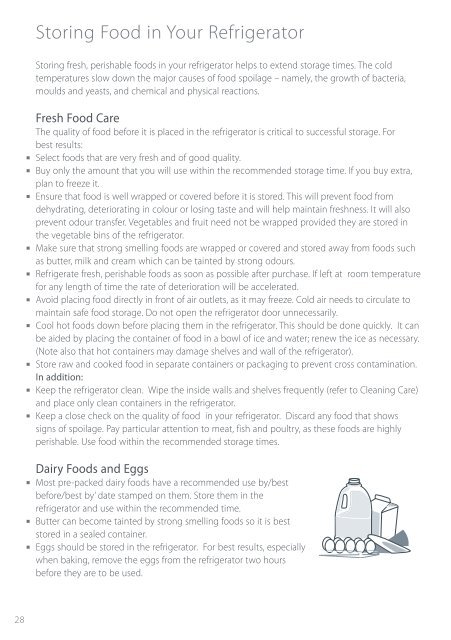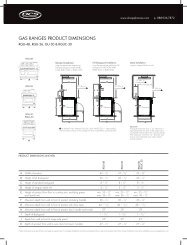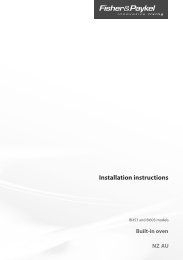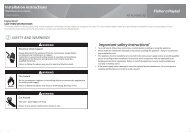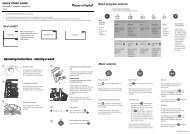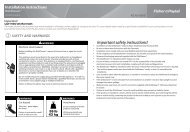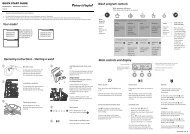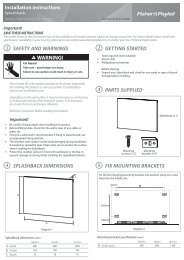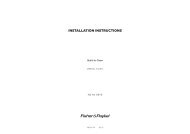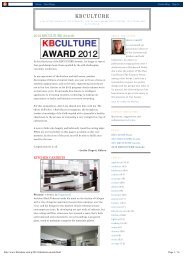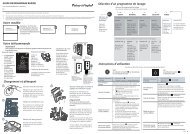Refrigerators & Freezers User Guide Asia 2006 - Fisher & Paykel
Refrigerators & Freezers User Guide Asia 2006 - Fisher & Paykel
Refrigerators & Freezers User Guide Asia 2006 - Fisher & Paykel
You also want an ePaper? Increase the reach of your titles
YUMPU automatically turns print PDFs into web optimized ePapers that Google loves.
28<br />
Storing Food in Your Refrigerator<br />
Storing fresh, perishable foods in your refrigerator helps to extend storage times. The cold<br />
temperatures slow down the major causes of food spoilage – namely, the growth of bacteria,<br />
moulds and yeasts, and chemical and physical reactions.<br />
Fresh Food Care<br />
The quality of food before it is placed in the refrigerator is critical to successful storage. For<br />
best results:<br />
Select foods that are very fresh and of good quality.<br />
Buy only the amount that you will use within the recommended storage time. If you buy extra,<br />
plan to freeze it.<br />
Ensure that food is well wrapped or covered before it is stored. This will prevent food from<br />
dehydrating, deteriorating in colour or losing taste and will help maintain freshness. It will also<br />
prevent odour transfer. Vegetables and fruit need not be wrapped provided they are stored in<br />
the vegetable bins of the refrigerator.<br />
Make sure that strong smelling foods are wrapped or covered and stored away from foods such<br />
as butter, milk and cream which can be tainted by strong odours.<br />
Refrigerate fresh, perishable foods as soon as possible after purchase. If left at room temperature<br />
for any length of time the rate of deterioration will be accelerated.<br />
Avoid placing food directly in front of air outlets, as it may freeze. Cold air needs to circulate to<br />
maintain safe food storage. Do not open the refrigerator door unnecessarily.<br />
Cool hot foods down before placing them in the refrigerator. This should be done quickly. It can<br />
be aided by placing the container of food in a bowl of ice and water; renew the ice as necessary.<br />
(Note also that hot containers may damage shelves and wall of the refrigerator).<br />
Store raw and cooked food in separate containers or packaging to prevent cross contamination.<br />
In addition:<br />
Keep the refrigerator clean. Wipe the inside walls and shelves frequently (refer to Cleaning Care)<br />
and place only clean containers in the refrigerator.<br />
Keep a close check on the quality of food in your refrigerator. Discard any food that shows<br />
signs of spoilage. Pay particular attention to meat, fish and poultry, as these foods are highly<br />
perishable. Use food within the recommended storage times.<br />
Dairy Foods and Eggs<br />
Most pre-packed dairy foods have a recommended use by/best<br />
before/best by’ date stamped on them. Store them in the<br />
refrigerator and use within the recommended time.<br />
Butter can become tainted by strong smelling foods so it is best<br />
stored in a sealed container.<br />
Eggs should be stored in the refrigerator. For best results, especially<br />
when baking, remove the eggs from the refrigerator two hours<br />
before they are to be used.


